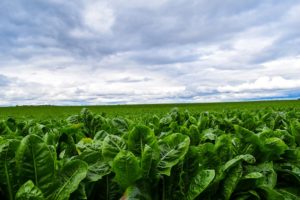Very often we encounter headlines linking leafy greens with E. coli outbreaks; usually tied to spinach or romaine lettuce. Why is there a connection between E. coli and leafy greens?

In Salinas, California, investigators discovered that cattle feces from a lot uphill from produce growing fields were contaminated with E. coli. The E. coli strain matched the strain from recurring outbreaks tied to leafy greens throughout 2019 and 2020. The outbreaks spanned 19 states and sickened 40 people.
The Food and Drug Administration (FDA) narrowed the search to this region by sampling cattle droppings, soil, compost, water, and other environmental sources. Now investigators will be collecting and testing samples of lettuce grown in California’s Salinas Valley from May through November 2021.
The agency plans to collect and test about 500 post-harvest samples of the iceberg, leaf, and romaine lettuce. Each sample will consist of 10 subsamples, each made up of one head of lettuce (trimmed, cored, and possibly wrapped), or in the case of romaine lettuce, loose leaves, or one package of hearts. The FDA’s laboratories will conduct all testing.

The agency stated, “. . . as recommended in our Leafy Greens Action Plan, the FDA continues to recommend growers assess and mitigate risk associated with adjacent and nearby land-use practices, particularly as it relates to the presence of livestock, which is a persistent reservoir of E. coli O157:H7 and other STEC.”
The Leafy Greens Action Plan presents a comprehensive solution for the recurrence of E. coli tied to leafy greens and addresses issues including farming runoff, irrigation, extensive testing, and water treatment.
These measures will help keep consumers safe from foodborne illnesses. If you have experienced a foodborne illness through no fault of your own, you may be entitled to compensation. Call Allen & Allen today for a free consultation, at 866-388-1307.




